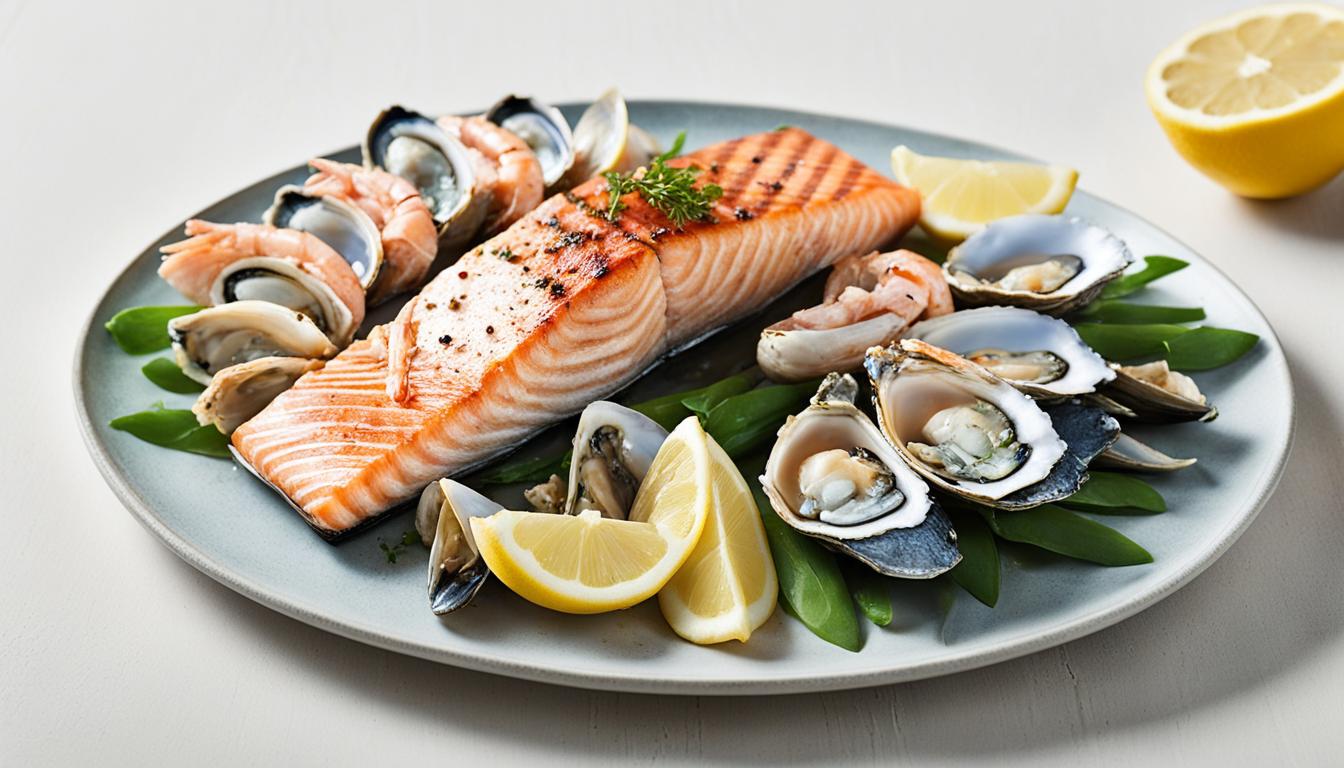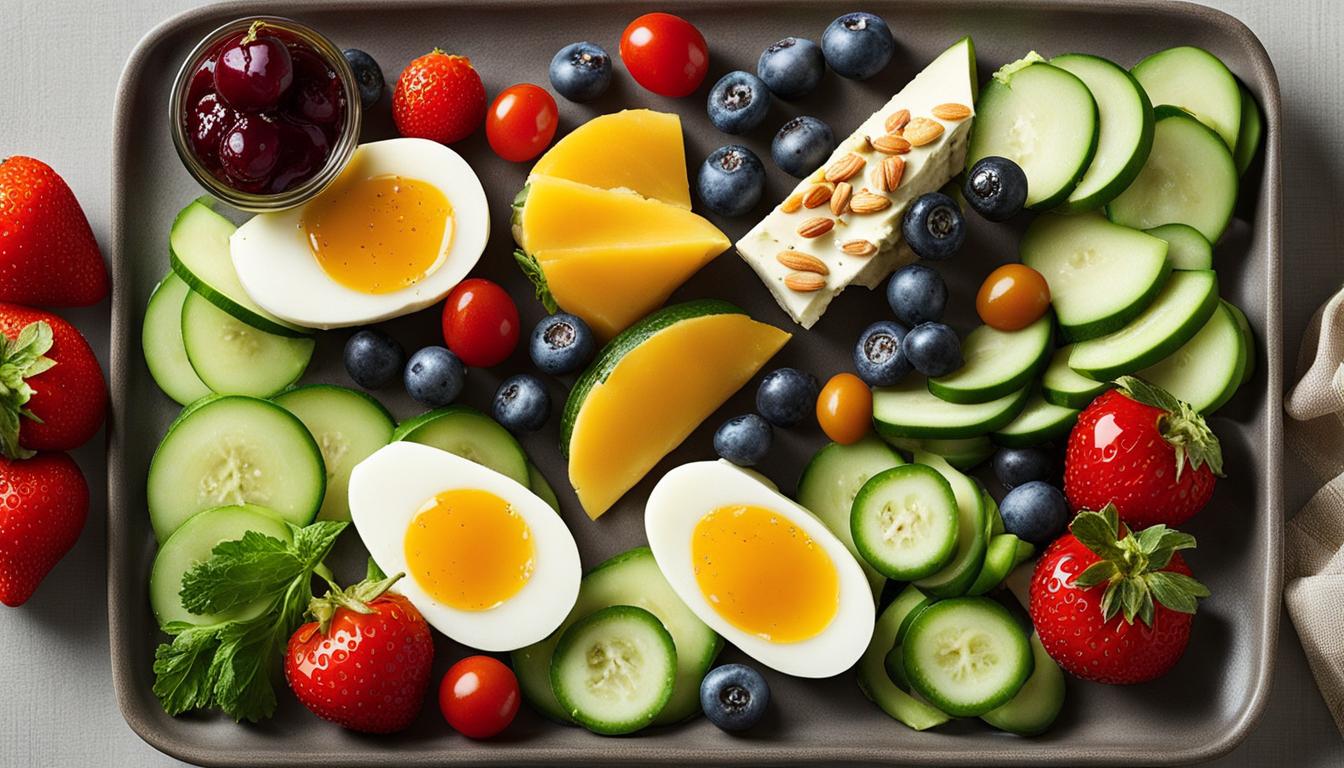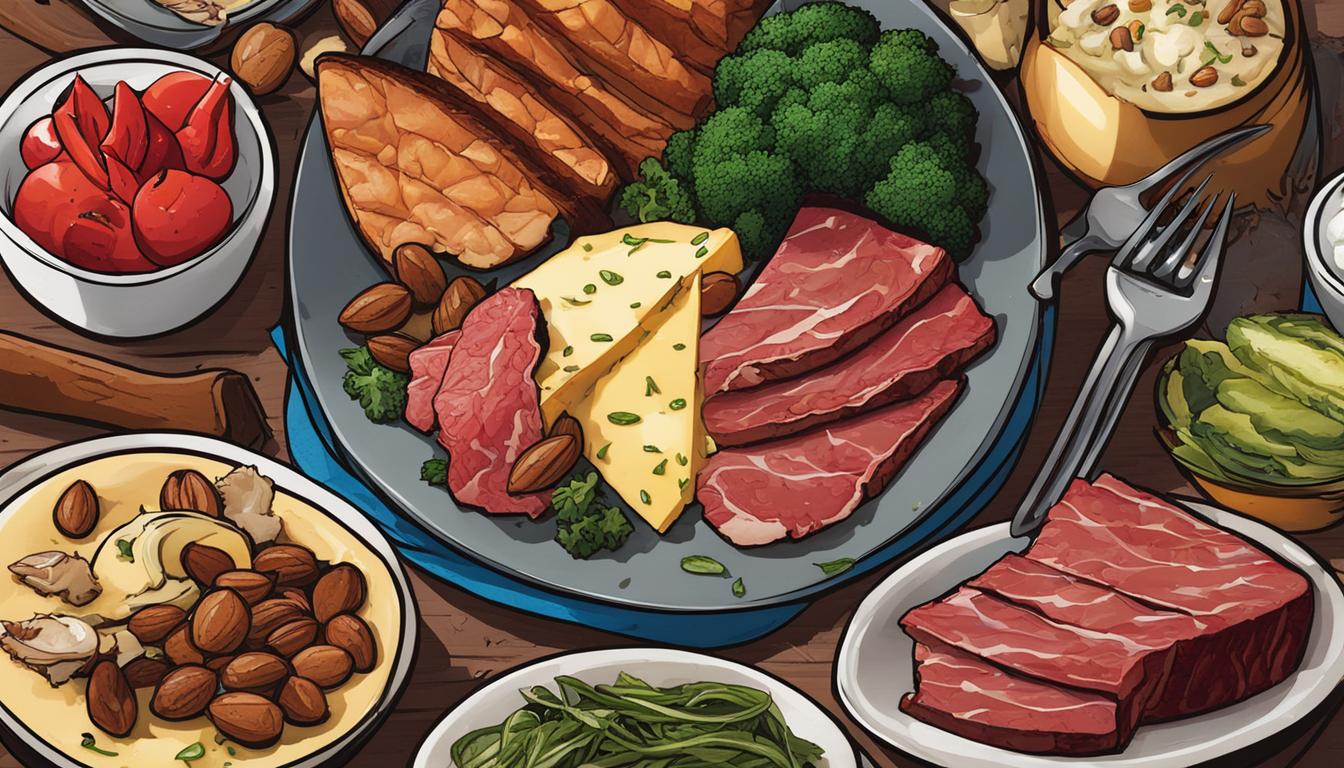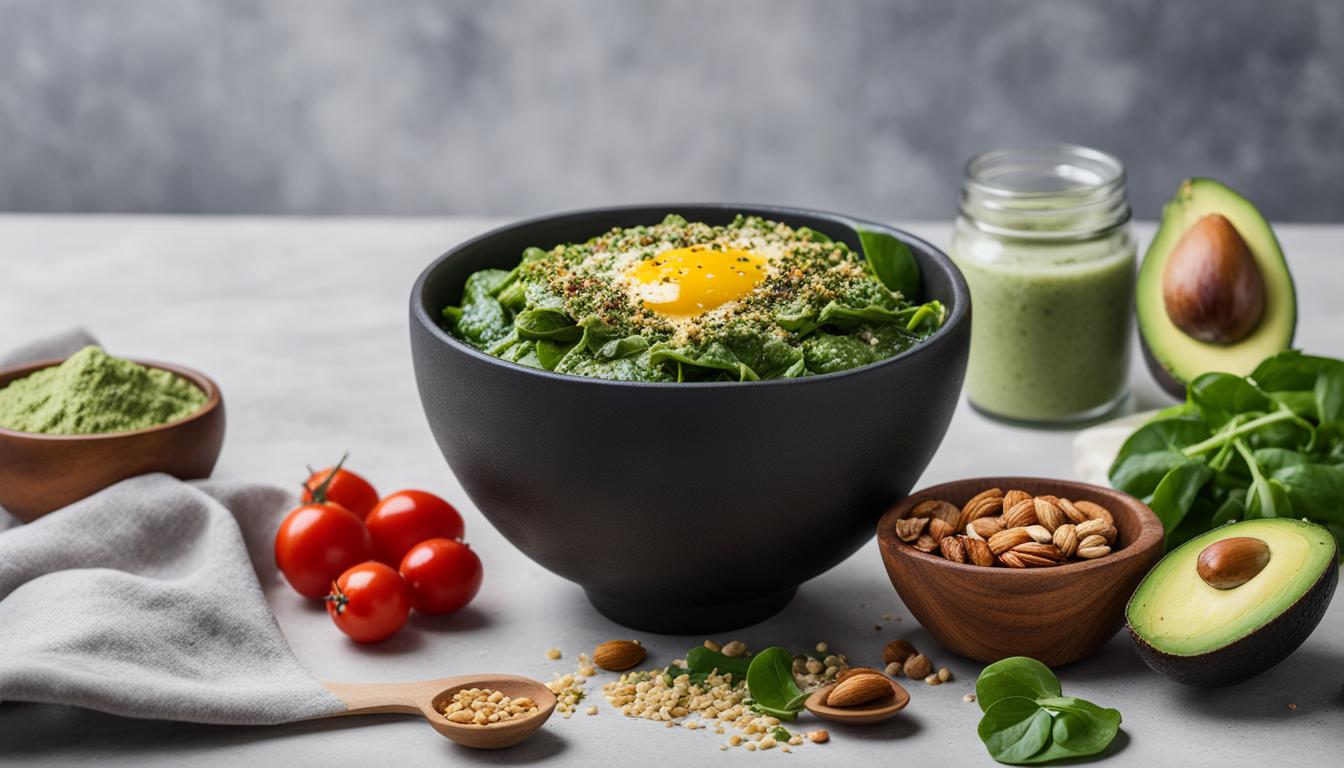When following a low-carb or keto diet, it can be helpful to know which foods have no carbs. In this article, we will explore a comprehensive list of zero-carb foods that are perfect for those on a low-carb or keto lifestyle. We have gathered this information from reliable sources and categorized the foods by meat, fish and seafood, fats and oils, drinks, seasonings, condiments, sweeteners, and snacks.
Key Takeaways:
- Zero-carb foods are essential for those following a low-carb or keto diet.
- Meats like beef, chicken, lamb, and pork are great options with no carbs.
- Fish and seafood, such as salmon, tilapia, and tuna, are also zero-carb choices.
- Fats and oils like butter, olive oil, and coconut oil contain no carbs.
- Drinks like water, black coffee, and tea are zero-carb options.
No-Carb Meats
Meat is a staple category in a zero-carb diet. Most meat in its natural form contains zero carbs and is rich in protein. This includes beef, chicken, lamb, pork, veal, and more. It’s important to choose high-quality, grass-fed or organic options when possible to avoid additives and unhealthy ingredients found in low-quality meat. Other zero-carb meats include venison, duck, hot dogs, sausages, deli meats, and most organ meats (except liver).
When it comes to a zero-carb diet, meats are a go-to source. They offer not only the satisfaction of a protein-packed meal but also the assurance of being virtually carb-free. A variety of meats can be included in your zero-carb meal plan, providing both taste and nutritional value. The list of meats with zero carbs is extensive, ranging from popular options like beef, chicken, and pork to more unique choices such as duck and venison. Additionally, convenient options like hot dogs and deli meats are also part of the zero-carb meats category.
It’s important to note that opting for high-quality meats is key to maximizing health benefits. Choosing grass-fed or organic options can help avoid additives and unhealthy ingredients that may be present in low-quality meat. By making informed decisions and prioritizing the quality of your meat, you can confidently enjoy the benefits of zero-carb meats while nourishing your body with wholesome options.
The Benefits of Zero-Carb Meats
- Rich in protein
- No carbs
- High-quality source of nutrients
- Offers versatility in meal planning
“Zero-carb meats provide the essential protein your body needs while keeping your carb intake low. They are a healthy and satisfying part of a zero-carb lifestyle.”
By incorporating zero-carb meats into your diet, you can enjoy delicious and nutritious meals that align with your low-carb goals. Whether you prefer beef, chicken, lamb, or other options, there are plenty of choices to suit your taste. Remember to prioritize high-quality, grass-fed or organic meats whenever possible to ensure you’re nourishing your body with the best options available.
| No-Carb Meats | Carb Content (per 100g) |
|---|---|
| Beef | 0g |
| Chicken | 0g |
| Lamb | 0g |
| Pork | 0g |
| Veal | 0g |
| Venison | 0g |
| Duck | 0g |
| Hot dogs | 0g |
| Sausages | 0g |
| Deli meats | 0g |
| Organ meats (except liver) | 0g |
No-Carb Fish and Seafood
Fish and seafood are excellent sources of protein and can be enjoyed on a zero-carb diet. Many types of fish, including salmon, tilapia, tuna, and catfish, have no carbs. However, it’s important to note that some shellfish, such as oysters, shrimp, crab, mussels, and lobster, may contain trace amounts of carbs and should be consumed in moderation. Other zero-carb fish include trout, sardines, cod, bass, and haddock.

When incorporating fish and seafood into your zero-carb diet, it’s essential to choose fresh, high-quality sources to maximize nutritional benefits. Here is a table highlighting the carb content of common fish and seafood:
| Fish and Seafood | Carb Content (per 100g) |
|---|---|
| Salmon | 0g |
| Tilapia | 0g |
| Tuna | 0g |
| Catfish | 0g |
| Oysters | 0.3g |
| Shrimp | 0.2g |
| Crab | 1g |
| Mussels | 2.3g |
| Lobster | 0.9g |
| Trout | 0g |
| Sardines | 0g |
| Cod | 0g |
| Bass | 0g |
| Haddock | 0g |
Table: Carb content of common fish and seafood.
No-Carb Fats and Oils
When it comes to a zero-carb diet, fats and oils play a crucial role in providing essential nutrients and flavor. Fortunately, there are several options that contain no carbs, allowing you to enjoy delicious meals while staying on track with your low-carb lifestyle.
Butter: Rich and creamy, butter is a versatile fat with no carbs. It adds depth and richness to dishes and can be used in cooking or as a spread.
Olive oil: An essential component of Mediterranean cuisine, olive oil is a heart-healthy fat with zero carbs. It is perfect for dressings, sautéing, or drizzling over vegetables.
Coconut oil: This tropical oil is gaining popularity for its many health benefits and contains no carbs. It is ideal for cooking, baking, and even adding a subtle sweetness to smoothies.
Canola oil: Canola oil is a light and neutral oil that is commonly used for cooking and baking. With zero carbs, it can be a staple in your pantry.
Avocado oil: Made from the fruit of the avocado, avocado oil is a nutrient-dense oil that contains no carbs. It has a mild, buttery flavor and a high smoke point, making it suitable for various cooking methods.
Other fats and oils with no carbs that you can incorporate into your zero-carb diet include lard, suet, tallow, ghee, and MCT oil. These options offer a range of flavors and cooking capabilities, allowing you to experiment and create delicious meals while keeping your carb intake low.
To make the most of your zero-carb diet, it’s crucial to choose high-quality, unprocessed fats and oils. Opt for organic, cold-pressed, or extra virgin varieties whenever possible. This ensures that you are maximizing the nutritional benefits and avoiding any hidden carbs or unhealthy additives.
Benefits of No-Carb Fats and Oils:
“No-carb fats are not only flavorful but also provide essential nutrients. Incorporating these fats into your zero-carb diet can help promote satiety, support brain health, and enhance the absorption of fat-soluble vitamins.”
With the wide variety of no-carb fats and oils available, you can easily create a diverse range of meals while sticking to your low-carb goals. Whether you’re sautéing vegetables, dressing a salad, or adding richness to a recipe, these no-carb options are the perfect choice to support your zero-carb lifestyle.
Tips for Using No-Carb Fats and Oils:
- Experiment with different types of fats and oils to discover your preferred flavors and cooking methods.
- Read labels carefully to ensure that there are no added sugars or other carb-containing ingredients.
- Store oils and fats properly to maintain their freshness and flavor.
- Consider incorporating a variety of fats and oils into your diet to benefit from their unique nutritional profiles.
No-Carb Drinks
Staying hydrated is key on a low-carb or keto diet, and fortunately, there are several zero-carb drink options. Water is the ultimate zero-carb drink, and it’s crucial to consume plenty of it throughout the day. Other no-carb drinks include black coffee, sparkling water, soda water, and tea. It’s important to avoid sugar-sweetened beverages and opt for zero-carb alternatives.
No-Carb Seasonings
Seasonings and spices are the secret ingredients that can elevate the flavor of your meals without adding any extra carbs. Luckily, there are plenty of options available for those following a low-carb or keto lifestyle. Here are some popular seasonings that contain no carbs:
- Salt: A staple in every kitchen, salt is a versatile seasoning that adds a burst of flavor to savory dishes.
- Black pepper: This common spice is not only carb-free, but it also adds a touch of heat and complexity to your recipes.
- Oregano: Known for its earthy and aromatic flavor, oregano is a great addition to Italian and Mediterranean-style dishes.
- Rosemary: With its pine-like fragrance, rosemary pairs well with roasted meats and vegetables.
- Basil: This herb is a classic ingredient in Italian cuisine and adds a fresh, slightly sweet flavor to your dishes.
But the list doesn’t stop there! Here are some other seasonings with no carbs that you can experiment with:
- Thyme
- Dill
- Chives
- Cinnamon
- Chili powder
When selecting seasonings, it’s important to check the labels to ensure there are no added sugars or other carb-containing ingredients. Some pre-made seasoning blends may have hidden carbs, so it’s best to opt for individual spices and create your own flavor profiles.
“With the right combination of seasonings, you can transform a simple dish into a culinary masterpiece.”
Experimenting with different seasonings can make your low-carb meals more exciting and enjoyable. Don’t be afraid to get creative in the kitchen and try new flavor combinations. Just remember to stay mindful of portion sizes and be cautious of any seasonings that may contain hidden carbs.
No-Carb Condiments and Dips
Condiments and dips are essential for adding flavor and excitement to your meals while following a zero-carb diet. Whether you’re looking for a tangy kick or a creamy dip, there are plenty of options that contain little to no carbs. Here are some delicious condiments and dips that will enhance your low-carb culinary creations:
1. Vinegar
Vinegar is a versatile and zero-carb condiment that can be used to make homemade vinaigrettes for salads or marinades for meats. Whether it’s balsamic, apple cider, red wine, or white vinegar, you can rely on these flavorful options to add a zing to your dishes.
2. Mayonnaise
Mayonnaise is a creamy and zero-carb option that can elevate your sandwiches, burgers, or salads. However, it’s important to choose mayonnaise that does not contain added sugars, as some store-bought varieties may sneak in unnecessary carbs. Opt for sugar-free or homemade mayonnaise to stay true to your zero-carb goals.
3. Liquid Aminos
Liquid aminos, such as Bragg’s Liquid Aminos, are an excellent alternative to traditional soy sauce. Not only are they low in carbs, but they also add a savory umami flavor to your stir-fries, marinades, or dipping sauces. Plus, they are gluten-free and suitable for individuals with soy allergies.
4. Hot Sauces
Spice up your meals with hot sauces that are low in carbs, such as Tabasco, Sriracha, or Frank’s RedHot. These fiery condiments can add a kick to your eggs, meats, or vegetables without adding unnecessary carbs. Just be cautious of hot sauces that contain added sugars or sweeteners.
5. Olive Oil with Herbs and Seasonings
Create your own flavorful condiment by infusing olive oil with herbs and seasonings. Simply combine extra virgin olive oil with your favorite herbs, such as rosemary, basil, thyme, or oregano, and allow the flavors to meld together. This aromatic oil can be drizzled over salads, roasted vegetables, or grilled meats for a burst of taste.
6. Dijon Mustard
Dijon mustard is a classic and zero-carb condiment that adds a tangy and slightly spicy flavor to your dishes. It can be used as a sandwich spread, a dip for vegetables, or a glaze for roasted meats. Look for Dijon mustard varieties that do not have added sugars for a truly zero-carb option.
Remember to read the labels of condiments and dips carefully to avoid hidden carbs. Some brands may include sugars, high-fructose corn syrup, or other carb-containing ingredients. By selecting condiments and dips that are specifically labeled as “zero carb” or “sugar-free,” you can enjoy the flavors you love without compromising your low-carb lifestyle.
As you experiment with different options, you’ll discover new and exciting ways to enhance your zero-carb meals. Whether you’re dressing up a fresh salad or dipping your favorite veggies, these condiments and dips will take your culinary creations to the next level, all while keeping your carb intake in check.
No-Carb Sweeteners
Satisfying your sweet tooth on a zero-carb diet can be challenging, but there are several no-carb sweetener options available. These zero-carb sweeteners can provide the sweetness you crave without adding any carbs to your diet. Let’s explore some of the popular options:
1. Stevia
Stevia is a well-known zero-carb sweetener that is derived from the “sugar leaf.” It is much sweeter than regular sugar, so a little goes a long way. Stevia is available in liquid or powdered form and can be used as a substitute for sugar in beverages, baked goods, and other recipes.
2. Pure Erythritol
Pure erythritol is another zero-carb sweetener that can be used in moderate amounts. It has a similar taste and texture to sugar, making it an excellent choice for baking and sweetening drinks. Erythritol is reputed to have minimal impact on blood sugar levels and is well-tolerated by most people.
3. Monk Fruit
Monk fruit, also known as luo han guo, is a natural zero-carb sweetener that is derived from the monk fruit plant. It has been used for centuries in traditional Chinese medicine and is known for its intense sweetness. Monk fruit sweetener is available in granulated form and can be used in a variety of recipes.
When choosing no-carb sweeteners, it’s essential to read labels and ingredients carefully. Avoid sweeteners that contain sugars, dextrose, maltodextrin, or other carb-containing additives. Stick to natural sweeteners that have no impact on blood sugar levels, allowing you to satisfy your sweet cravings while staying true to your low-carb lifestyle.
No-Carb Snacks
Finding satisfying snacks on a zero-carb diet can be tricky, but there are a few options available. Beef jerky, dried seaweed sheets, pork rinds, pepperoni, salami, and salmon skins are all zero-carb snacks that can be enjoyed in moderation. It’s important to choose snacks that do not contain additives or added sugars, as these can add unnecessary carbs.

Zero-Carb Snack Ideas
- Beef jerky: A convenient and protein-packed snack that is virtually carb-free.
- Dried seaweed sheets: A crispy and nutritious option that is rich in minerals.
- Pork rinds: A crunchy and satisfying snack that is carb-free and high in protein.
- Pepperoni and salami: Delicious cured meats that are typically carb-free.
- Salmon skins: Crispy and flavorful, providing healthy fats and protein.
These snacks not only offer a low or zero-carb option but also provide a good amount of protein and healthy fats, making them ideal choices for individuals on a low-carb or keto diet. Remember to enjoy these snacks in moderation and prioritize natural, unprocessed options to maximize nutritional benefits.
Low-Carb Dairy, Fruits, Vegetables, Nuts, and Seeds
While not completely carb-free, there are several options for low-carb dairy, fruits, vegetables, nuts, and seeds, which can be enjoyed in moderation as part of a low-carb diet. Incorporating these foods into your meals provides additional nutritional value and variety.
Low-Carb Dairy
When it comes to dairy products, there are low-carb options that you can include in your diet. Eggs are a versatile and nutritious choice, as they are high in protein and contain minimal carbs. String cheese and goat cheese are also low in carbs, making them suitable options for those on a low-carb diet.
Low-Carb Fruits
Fruits can be enjoyed in moderation on a low-carb diet. Berries such as raspberries, blackberries, and strawberries are low in carbs and high in fiber, making them a great choice for satisfying your sweet cravings. These fruits can be added to yogurt or enjoyed on their own.
Low-Carb Vegetables
Leafy greens are excellent low-carb vegetable options. Incorporate spinach, kale, and lettuce into your meals to boost your nutrient intake without adding many carbs. Other low-carb vegetable choices include avocados, cucumbers, and tomatoes.
Low-Carb Nuts and Seeds
Nuts and seeds are a great source of healthy fats and protein while being low in carbs. Examples of low-carb nuts and seeds include almonds, walnuts, chia seeds, flaxseeds, and pumpkin seeds. These can be enjoyed as a snack or added to salads, yogurt, or smoothies to increase their nutritional value.
Summary
Incorporating low-carb dairy, fruits, vegetables, nuts, and seeds into your diet provides a wide range of options for maintaining a balanced low-carb lifestyle. These foods offer essential nutrients, satisfying flavors, and flexibility, enabling you to enjoy a variety of tasty and nutritious meals while keeping your carb intake in check.
Conclusion
In summary, following a low-carb or keto diet doesn’t mean sacrificing taste or variety in your meals. With a wide range of delicious and nutritious foods that have no carbs, you can enjoy a satisfying and healthy eating plan. By focusing on high-quality meats, fish and seafood, fats and oils, drinks, seasonings, condiments, sweeteners, and snacks, you have plenty of options to create a zero-carb lifestyle that suits your taste buds.
When choosing no-carb foods, it’s crucial to prioritize natural, unprocessed options and read labels carefully. This ensures that you avoid hidden carbs or additives that can derail your low-carb or keto journey. Additionally, consulting with a healthcare professional or registered dietitian can provide personalized guidance and support as you make changes to your diet. They can help you navigate any challenges and ensure your nutritional needs are met.
In your pursuit of a zero-carb lifestyle, remember that sustainable and enjoyable eating habits are key. Experiment with different recipes and meal ideas to keep things interesting and prevent boredom. And always listen to your body’s signals of hunger and fullness to maintain a healthy relationship with food. With these final thoughts in mind, you’re well-equipped to embark on a low-carb or keto journey that supports your health and well-being.
FAQ
What foods have no carbs?
There are several categories of zero-carb foods, including meats, fish and seafood, fats and oils, drinks, seasonings, condiments, sweeteners, snacks, and low-carb dairy, fruits, vegetables, nuts, and seeds.
What meats have no carbs?
Meats such as beef, chicken, lamb, pork, veal, venison, duck, hot dogs, sausages, deli meats, and most organ meats (except liver) contain no carbs.
What fish and seafood have no carbs?
Fish such as salmon, tilapia, tuna, catfish, trout, sardines, cod, bass, and haddock have no carbs. Some shellfish, like oysters, shrimp, crab, mussels, and lobster, may contain trace amounts of carbs.
What fats and oils have no carbs?
Fats and oils such as butter, olive oil, coconut oil, canola oil, avocado oil, lard, suet, tallow, ghee, and MCT oil have no carbs.
What drinks have no carbs?
Water, black coffee, sparkling water, soda water, and tea are all zero-carb drink options. Avoid sugar-sweetened beverages.
What seasonings have no carbs?
Common seasonings like salt, black pepper, oregano, rosemary, and basil have no carbs. Other zero-carb seasonings include thyme, dill, chives, cinnamon, and chili powder.
What condiments and dips have no carbs?
Vinegar, mayonnaise, liquid aminos, hot sauces, olive oil with herbs and seasonings, and Dijon mustard are all condiments and dips with no carbs. Check labels for added sugars.
What sweeteners have no carbs?
Stevia, pure erythritol, and monk fruit are popular zero-carb sweeteners. Avoid sweeteners that contain sugars or other carb-containing ingredients.
What snacks have no carbs?
Beef jerky, dried seaweed sheets, pork rinds, pepperoni, salami, and salmon skins are all zero-carb snacks. Choose options without additives or added sugars.
What low-carb options are there for dairy, fruits, vegetables, nuts, and seeds?
While not completely carb-free, options like eggs, string cheese, goat cheese, berries, leafy greens, avocados, cucumbers, tomatoes, and various nuts and seeds are low in carbs and can be enjoyed in moderation.


